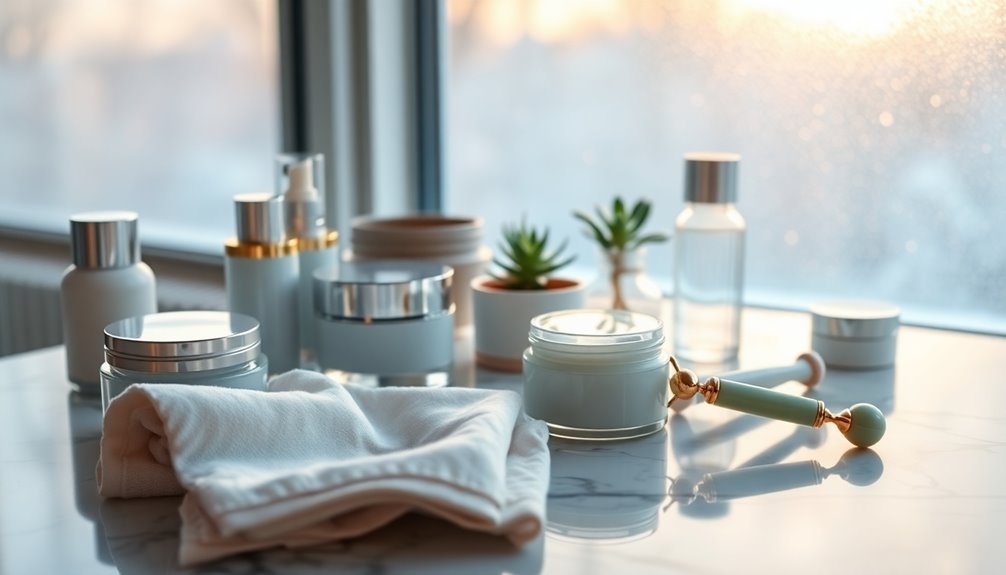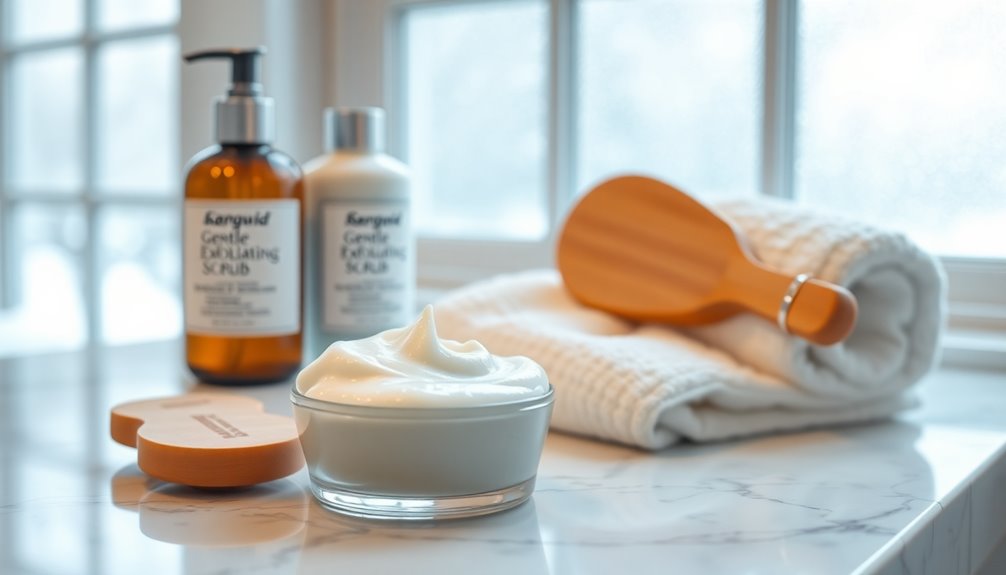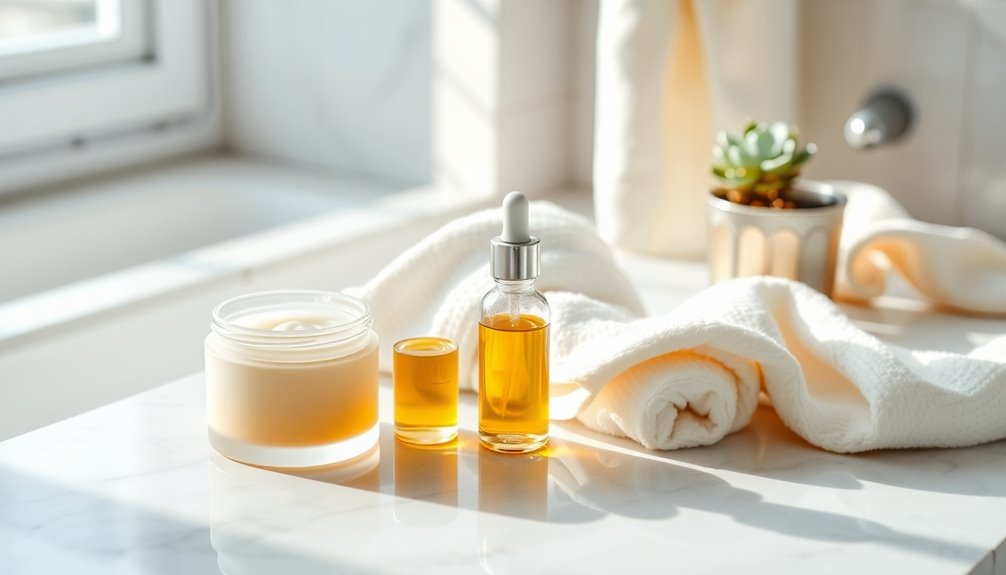To combat winter dryness, start with a hydrating cleanser to preserve your skin's natural oils. Follow up with gentle exfoliation once or twice a week to remove dead skin cells. Next, apply a rich moisturizer containing ingredients like hyaluronic acid and ceramides to lock in moisture. Incorporate facial oils for added nourishment, and consider overnight masks for deep hydration. Don't forget to drink plenty of water and consume hydrating foods like oranges and cucumbers. Finally, using a humidifier can improve indoor air quality. There's so much more to explore for winter skin care, so keep moving forward to discover additional tips!
Key Takeaways
- Use hydrating cleansers like creamy or oil-based formulas to preserve natural oils during winter.
- Apply a moisturizer containing hyaluronic acid, glycerin, or ceramides immediately after cleansing to lock in moisture.
- Exfoliate gently 1-2 times a week with mild agents to remove dead skin and enhance product absorption.
- Incorporate facial oils or overnight masks for deep hydration, especially during dry, cold nights.
- Maintain hydration by drinking water, consuming hydrating foods, and using a humidifier to combat dry indoor air.
Understanding Winter Skin Needs

As the temperature drops and the air turns dry, your skin's needs shift dramatically. You may notice that your usual moisturizer just isn't cutting it anymore. Cold weather strips your skin of its natural moisture, leading to dryness, flakiness, and irritation. It's crucial to understand how winter affects your skin so you can adapt your routine accordingly.
During these months, your skin loses hydration more quickly due to lower humidity levels. This means you need to focus on products that not only hydrate but also help lock in moisture. Look for ingredients like hyaluronic acid, glycerin, and ceramides, which work wonders in retaining water and forming a protective barrier. Incorporating hyaluronic acid serums into your routine can significantly enhance your skin's hydration levels. In addition, using a Vitamin C serum can also provide antioxidant protection against environmental stressors.
Additionally, your skin may become more sensitive as temperatures drop, so it's wise to avoid harsh ingredients that can exacerbate irritation. Instead, opt for gentler formulations that soothe and nourish.
Your skin might also benefit from a richer, creamier moisturizer compared to lighter lotions you've used in warmer months. Pay attention to any changes and adjust your products accordingly to keep your skin healthy and glowing all winter long.
Cleansing: Choose the Right Products
Cleansing is the foundation of any effective skincare routine, especially during winter when your skin needs extra care.
You'll want to choose a cleanser that hydrates rather than strips your skin of its natural oils. Look for creamy, hydrating formulas or oil-based cleansers that maintain your skin's moisture barrier. Avoid harsh foaming cleansers, as they can leave your skin feeling tight and dry. Incorporating a coconut oil moisturizer after cleansing can further boost your skin's hydration levels.
When washing your face, use lukewarm water instead of hot, as hot water can exacerbate dryness. Gently massage the cleanser onto your skin in circular motions, allowing it to work without causing irritation. Rinse thoroughly, ensuring no residue is left behind.
If you wear makeup, consider using a double-cleansing method. Start with an oil-based cleanser to dissolve makeup, followed by your regular hydrating cleanser to clean your skin thoroughly. Incorporating cleansing oil into your routine can enhance hydration and comfort for dry winter skin.
Lastly, don't forget to cleanse your skin both morning and night. This habit prevents the buildup of dirt and impurities, allowing your skin to absorb the hydrating products you'll apply afterward. Regular cleansing can also help your skin better retain moisture throughout the day, making it essential for combating dryness.
Exfoliation: Gentle Techniques to Use

Exfoliation is a crucial step in your winter skincare routine, helping to slough away dead skin cells and reveal a brighter complexion. During the colder months, your skin can become dry and flaky, making gentle exfoliation essential. Opt for products that contain mild exfoliating agents, like lactic acid or enzymes, to avoid irritation.
You should aim to exfoliate 1-2 times a week. Start by applying your chosen exfoliant to clean, dry skin. Use gentle, circular motions to massage it in, focusing on areas that tend to get rough, like your elbows and knees.
Be mindful not to scrub too hard; your goal is to remove dead skin without damaging the healthy layers underneath. If you prefer physical exfoliants, choose those with fine particles that won't scratch your skin.
Always follow up with a soothing toner to help calm any redness and prepare your skin for the next steps in your routine. Remember, consistency is key—regular gentle exfoliation will keep your skin smooth and allow your other products to penetrate better. Additionally, incorporating face exfoliating pads into your routine can provide a convenient and effective way to maintain your skin's health.
Keep it easy and enjoy the glow that comes with proper care!
Hydration: Importance of Moisturizers
How can you keep your skin hydrated during the harsh winter months? One of the most effective ways is to incorporate a good moisturizer into your skincare routine.
Moisturizers create a barrier on your skin that locks in moisture and prevents it from escaping, which is crucial when the air turns cold and dry.
When selecting a moisturizer, look for ingredients like hyaluronic acid, glycerin, and ceramides. These components help attract and retain water, providing your skin with the hydration it craves.
You should apply your moisturizer right after cleansing and exfoliating to seal in moisture while your skin is still damp.
Don't forget to reapply throughout the day, especially if you're spending time outdoors or in heated indoor environments.
A travel-sized moisturizer can easily fit in your bag, making it convenient to give your skin a little extra love whenever needed.
Specialized Treatments for Dryness

When winter's chill leaves your skin feeling parched, specialized treatments can provide the extra support it needs. Look for products that contain ingredients specifically designed to combat dryness.
Hyaluronic acid is a powerful humectant that draws moisture into the skin, keeping it plump and hydrated. You might also consider using serums infused with glycerin, which helps to lock in moisture and create a barrier against cold air.
Another effective option is to incorporate facial oils into your routine. Oils like argan, jojoba, or rosehip can nourish your skin, offering a protective layer that seals in hydration.
Apply a few drops after your moisturizer to really amp up the moisture levels.
Don't forget about overnight masks or sleeping packs. These treatments work while you sleep, providing deep hydration and allowing you to wake up with soft, supple skin.
Lastly, if you're dealing with particularly stubborn dryness, consult a dermatologist for prescription-strength treatments. They can recommend creams or ointments that cater specifically to your skin's needs, ensuring you stay comfortably hydrated throughout the winter months.
Sun Protection During Winter
Even in the depths of winter, your skin needs protection from the sun's harmful rays.
It's a common misconception that UV exposure decreases in colder months, but that's far from the truth. Snow can reflect up to 80% of UV radiation, meaning you could be getting more sun exposure than you realize.
To keep your skin safe, start by applying a broad-spectrum sunscreen with at least SPF 30 every day, even when it's cloudy.
Make it part of your morning routine, and don't skip it on those chilly days. If you're planning to spend extended time outdoors, reapply every two hours or immediately after sweating or towel-drying.
Don't forget to protect your lips and other exposed areas like your ears and neck.
Use a lip balm with SPF and consider wearing a wide-brimmed hat or scarf for additional protection.
Diet and Hydration for Skin

Protecting your skin from winter's harsh elements goes beyond just sunscreen; what you eat and drink plays a significant role too. A balanced diet rich in vitamins and nutrients can help maintain your skin's health during the colder months.
Focus on incorporating foods high in antioxidants like berries, leafy greens, and nuts, which combat oxidative stress and promote skin repair.
Omega-3 fatty acids are your friends too. Foods like salmon, flaxseeds, and walnuts can help keep your skin's barrier strong, preventing moisture loss.
Don't forget about hydration! It's easy to overlook drinking water in winter, but your skin needs hydration just as much when it's cold. Aim for at least eight glasses a day, and consider herbal teas for extra warmth.
Avoid excessive caffeine and alcohol, as they can dehydrate your body and skin. Instead, snack on hydrating fruits like oranges and cucumbers, which also provide essential vitamins.
Lastly, consider a daily multivitamin if you're worried about getting all the nutrients you need. By adjusting your diet and hydration, you're setting your skin up for a healthier winter glow.
Lifestyle Tips for Skin Health
Maintaining skin health in winter requires more than just a good skincare routine; it involves making lifestyle choices that support your skin's integrity.
Start by staying hydrated. Even if it's cold outside, drink plenty of water throughout the day. Your skin needs moisture from within, so don't skip that glass of water.
Next, consider your clothing choices. Opt for breathable fabrics that allow your skin to breathe, and don't forget to layer up. Wool can irritate, so wearing a soft layer underneath can help prevent itching and dryness.
Also, pay attention to your environment. Use a humidifier in your home to combat dry air, especially when heating systems are running. This added moisture can do wonders for your skin.
Lastly, prioritize sleep. Quality rest supports your skin's repair process, helping it recover from damage and maintain a healthy glow. Make sure you're getting enough shut-eye each night.
Frequently Asked Questions
How Often Should I Change My Skincare Products in Winter?
You should assess your skincare products every few weeks in winter. If you notice your skin feeling dry or irritated, consider switching to more hydrating options. Your skin's needs can change with the season.
Can Winter Dryness Affect My Skin's Aging Process?
Yes, winter dryness can accelerate your skin's aging process. When your skin loses moisture, it can lead to fine lines and wrinkles. Keeping your skin hydrated helps maintain its elasticity and youthful appearance during colder months.
Are There Specific Ingredients to Avoid in Winter?
You should avoid ingredients like alcohol, synthetic fragrances, and harsh exfoliants during winter. These can strip moisture and irritate your skin, making dryness worse. Instead, focus on gentle, hydrating products to maintain your skin's balance.
How Do Indoor Heating Systems Impact Skin Moisture?
Indoor heating systems dry out the air, pulling moisture from your skin. You might notice your skin feeling tight or flaky. To counteract this, consider using a humidifier to maintain better hydration levels indoors.
Can I Use the Same Routine for My Body and Face?
You can use similar products for both your body and face, but remember, facial skin is usually more sensitive. Adjust your routine based on specific needs, opting for lighter formulas for the face and thicker ones for the body.
Conclusion
As winter wraps its cold fingers around us, don't let your skin suffer in silence. Embrace a tailored skincare routine that nourishes and protects, helping you glow even in the frost. Remember, hydration is your best friend, and gentle care goes a long way. By making mindful choices for your skin and lifestyle, you can face the chill with confidence, ensuring that winter's dryness doesn't dim your radiant shine. Keep your sparkle alive!




